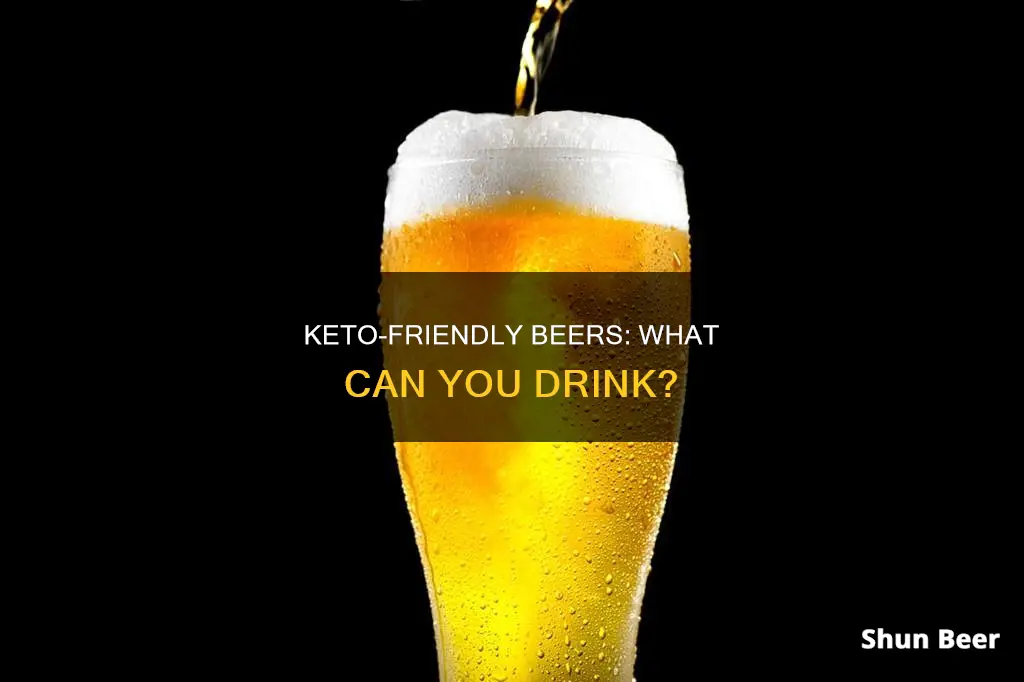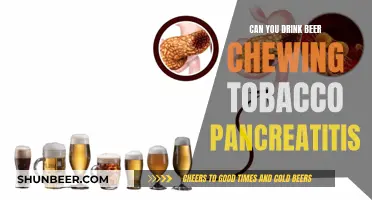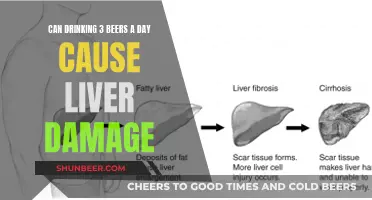
The ketogenic diet is a low-carb, high-fat diet that has become a huge trend in recent years. It is known mostly as a weight-loss diet, but it also has other health benefits, such as improving acne and potentially reducing the risk of cancer, heart disease, and brain function decline.
The keto diet is a challenging one, as it requires careful planning of meals to stick to the daily carb allotment and keep the body in ketosis. This often means giving up sweets, snacks, soft drinks, and alcohol. However, this does not mean giving up your favourite drinks entirely.
Most beers have a high carb content, which makes them unsuitable for the keto diet. However, there are some beers that are low in carbs, such as light beers, which can be consumed in moderation. Some examples of low-carb beers include Coors Light Lager Beer, Budweiser Select 55 Premium Light, and Corona Premier.
It is important to note that even low-carb beers should be consumed in moderation, as alcohol can affect decision-making and could lead to choosing foods or drinks that are not within the diet plan. Additionally, the body may use energy from alcohol before using ketones from body fat, potentially limiting the diet's effectiveness.
Therefore, while it is possible to drink beer on the keto diet, it is crucial to make informed choices and consume these beverages in moderation.
What You'll Learn
- Pure spirits like whiskey, brandy, cognac, vodka, gin, and tequila contain zero carbs
- Beer is problematic on keto due to its high carb content
- Wine is much lower in carbs than beer, so most people on keto choose wine
- Champagne and sparkling wine are also keto-friendly
- Dry wines have the lowest sugar content

Pure spirits like whiskey, brandy, cognac, vodka, gin, and tequila contain zero carbs
Pure spirits such as whiskey, brandy, cognac, vodka, gin, and tequila contain zero carbs and are the most keto-friendly alcohol choices. They can be enjoyed straight or mixed with low-carb ingredients to add flavor. For instance, a vodka soda is a refreshing and carb-free option.
When following a keto diet, it is important to avoid high-carb drinks. The typical daily carb allowance is 20-50 grams, and alcoholic beverages can quickly add up. However, if you choose low-carb options, you can still enjoy an occasional drink.
Light beers are a better choice than regular beers, as they typically have fewer carbs. Some light beers have less than 7 grams of carbs per serving, while others have less than 4 grams. Examples of low-carb light beers include Coors Light Lager Beer, Budweiser Select 55 Premium Light, and Miller 64 Extra Light Lager.
Wine is also a relatively low-carb option, usually containing under 6 grams of carbs per serving. Dry wines, in particular, are a great choice for keto dieters as they have no residual sugar. Champagne, Sauvignon Blanc, and Pinot Noir are good options, while sweeter wines like Moscato, Riesling, and dessert wines should be avoided.
It is important to note that while these alcoholic beverages are keto-friendly, they still contain calories. Alcohol is an energy source that the body burns before other sources, such as body fat. Therefore, excessive alcohol consumption can slow down weight loss and contribute to nutritional deficiencies and serious health conditions. It is always essential to drink in moderation and consult with a healthcare professional if you have any concerns.
Hipsters and Craft Beer: A Cultural Obsession?
You may want to see also

Beer is problematic on keto due to its high carb content
Beer is produced from starch and can contain over 12 grams of carbs in a single can or bottle. The average 12-ounce beer has about 13 grams of carbs, and some beers have even higher carb counts, making them unsuitable for a keto diet. For context, the typical daily allowance on a keto diet is 20-50 grams of carbohydrates.
While it is possible to find low-carb beers, with some containing less than 5 grams of carbs per serving, these are not as common as other alcoholic beverages that are naturally low-carb or carb-free. Pure forms of alcohol like whiskey, gin, tequila, rum, and vodka are all completely free of carbs. Wine and light beer are also relatively low in carbs, usually containing under 6 grams per serving.
Therefore, if you are following a keto diet, it is important to be mindful of your beer consumption and opt for low-carb options where possible.
To Drink or Not: Beer and Dental Fillings
You may want to see also

Wine is much lower in carbs than beer, so most people on keto choose wine
Wine is a much better option than beer for those on a keto diet, as it is much lower in carbs. A typical daily allowance on the keto diet is 20-50g of carbohydrates per day, and even then, there are limits as to what can be consumed in meals or drinks.
Wine typically contains under 6 grams of carbs per serving, with dry wines having the lowest sugar content. For example, a standard glass of both red and white wine contains about 4.7 grams of carbs. In contrast, beer is produced from starch and can contain 12 grams of carbs in just one can. Even light beers, which are recommended for those on keto, can contain up to 7 grams of carbs.
Champagne and sparkling wine are also good options, containing an average of 4.68 grams of carbs per glass. This means that enjoying a small glass to celebrate a special event should fit within most keto diet plans.
If you are on a keto diet, it is important to remember that pure spirits like whiskey, gin, tequila, rum, and vodka contain zero carbs. These can be drunk straight or combined with low-carb mixers for more flavor.
While it is possible to drink beer on a keto diet, it is best to choose light beers to stay within your daily carb allowance.
Beer and Ice Cream: A Match Made in Heaven?
You may want to see also

Champagne and sparkling wine are also keto-friendly
When it comes to choosing a keto-friendly drink, wine is much lower in carbs than beer, so most people on the keto diet choose wine. A standard glass of red or white wine contains about 4.7 grams of carbs, and dry wines have the lowest sugar content. Sweeter wines, like Rieslings and Gewurztraminers, have about 4 grams of carbs per glass. Even sweeter dessert wines can have 5 grams of carbs or more.
If you're looking for a beer option, light beers are a better choice for the keto diet. A pale lager, for example, contains an average of 5.81 grams of carbs per can. Some light beers, like Miller Lite, have about 3 grams of carbs per can. There are also low-carb beers available, such as Budweiser Select 55 and Miller 64.
While champagne and sparkling wine are keto-friendly, it's important to remember that alcohol can affect your judgment and willpower. Drinking can also have a more pronounced effect on your body when following a keto diet. Additionally, alcohol can slow down your rate of ketosis and affect your weight loss goals. So, even though you can enjoy a glass of champagne or sparkling wine while on the keto diet, it's important to do so in moderation.
The History of German Beer Steins and Drinking Culture
You may want to see also

Dry wines have the lowest sugar content
If you're following a keto diet, you may be wondering if you can still enjoy a beer. The answer is a strong maybe. While most beers have a high carb content, making them unsuitable for a keto diet, there are a few beers on the market that are light and low carb. These beers typically have less than 5 grams of carbs per beer, and some even have less than 4 grams. So, if you're craving a beer while on keto, you may be able to fit one into your daily carb allowance.
Now, when it comes to wine, the lowest sugar content is found in dry wines. Dry wines are those that are not too sweet, and they typically have lower residual sugar levels, ranging from 1 to 3 grams per litre of wine. The dryness of a wine depends on how much sugar the yeast has eaten during the fermentation process. The more sugar that's been eaten, the drier the wine will be.
Red wines tend to have the least amount of sugar, with around 0.9 grams per 175ml glass. Dry white wines, such as German Riesling, have slightly more, with around 1.4 grams per 175ml glass. Rosé wines can vary greatly in their sugar content, ranging from 35 to 120 grams per glass. So, if you're looking for a low-sugar wine, it's best to opt for a dry red or white wine.
When it comes to sparkling wines, the driest options are extra dry or "brut" varieties. These wines have lower sugar content, typically ranging from 0.6 to 2.0 percent per litre. Fortified wines, on the other hand, can have very high sugar content, with up to 150 grams of sugar per litre. So, if you're watching your sugar intake, it's best to avoid fortified wines like Port, Sherry, or Marsala.
Some companies cater specifically to the low-sugar market, such as FitVine and Dry Farm Wines, which offer wines with less than 1 gram of sugar per serving or per litre, respectively. However, it's important to remember that all wines are produced differently, and there may be variations in sugar content even within the same type of wine. Additionally, some winemakers may add sugar or grape juice to increase sweetness.
In conclusion, while following a keto diet, you may be able to enjoy an occasional low-carb beer or a glass of dry wine. Just be sure to check the sugar and carb content and enjoy in moderation as part of a well-balanced diet.
Alcohol-Free Beer: How Much Is Too Much?
You may want to see also
Frequently asked questions
The answer isn't so clear-cut. Beers typically have a high carb content, which makes them unsuitable for a keto diet. However, some beers are marketed as light and low-carb, with less than 5 grams of carbs per beer. So, if you want to enjoy a beer occasionally, you won't be undoing all your hard work.
Here are some low-carb beers you can choose from:
- Coors Light Lager Beer
- Kona Brewing Kahana Blonde Ale
- BrewDog Vagabond Pale Ale
- Lakefront Brewery Eazy Teazy Ale
- Budweiser Select 55 Premium Light
- Miller 64 Extra Light Lager
- Michelob Ultra Pure Gold
- Beck's Premier Light
- Devil's Backbone Bright Tangerine Sparkling Ale
- Corona Premier Light Lager
- DayTime IPA
Wine and pure spirits like whiskey, gin, tequila, rum, and vodka are keto-friendly as they are low in carbs or contain zero carbs. When choosing mixers, opt for low-carb options like diet soda, seltzer, diet tonic water, and powdered flavour packets.







